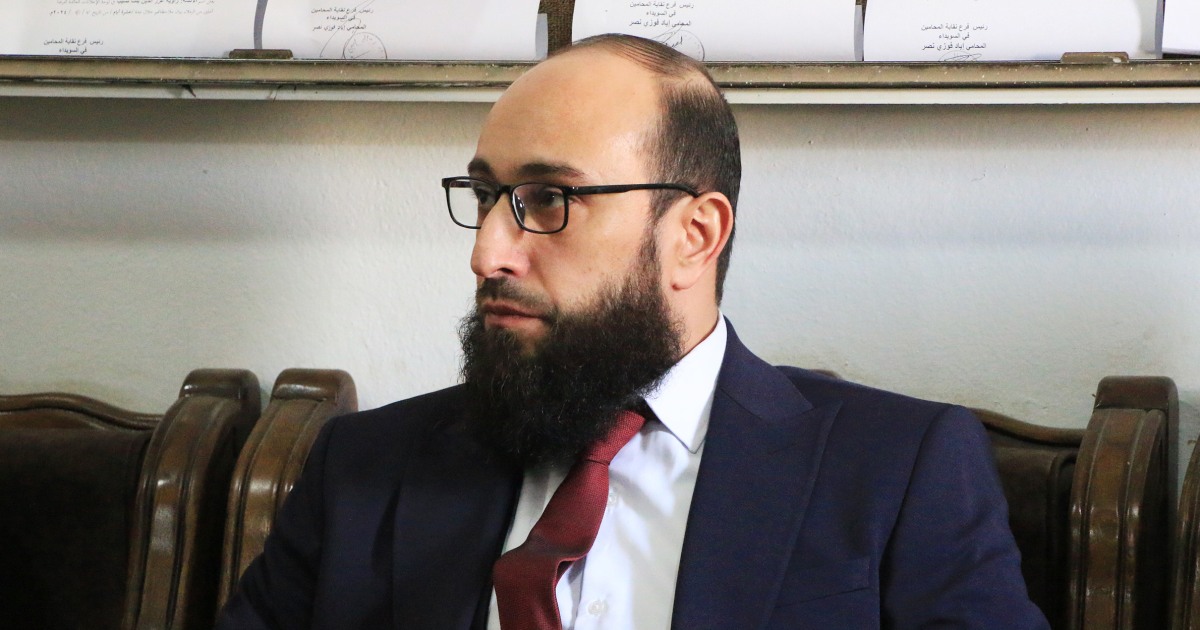DAMASCUS, Syria — In a shaky video filmed in 2015, a woman cloaked in black and kneeling on a public street begs to see her children for the last time. Instead, a man identified as Shadi al-Waisi, Syria’s new justice minister, motions to a gunman, who shoots her in the back of the head.
A second video shows al-Waisi reading out a death sentence for another woman, who, like the first, was convicted of corruption and prostitution. She is shot and drops to the ground.
The videos were filmed a decade ago, when al-Waisi was a judge for Jabhat al-Nusra, an Al Qaeda affiliate in Syria’s northern Idlib province. But they have re-emerged and are spreading widely on social media after he was appointed to his high-profile role in Syria’s new government, raising difficult questions about the country’s new leaders as they try to distance themselves from their extremist roots.
The videos were widely circulated at the time, but it wasn’t until earlier this month that Verify Sy, a respected Syrian news outlet, confirmed that al-Waisi was the man dispensing the sentences. Using specialized technical tools, Verify Sy said it matched al-Waisi’s features and voice to that of the man in the video.
It also interviewed a number of people who witnessed the executions and an official of the current government who confirmed that the man in the video was al-Waisi, but who went on to say that the executions were carried out during a stage that Syria had now moved beyond.
NBC News has reached out to al-Waisi’s office for comment about the videos, which contrast sharply with the moderate image espoused by Ahmad al-Sharaa, who appointed al-Waisi as justice minister. Sharaa became Syria’s de facto leader after spearheading the rebel advance that toppled President Bashar al-Assad’s brutal regime last month.
Sharaa, who was formerly known by his nom de guerre Abu Mohammad al-Jolani, was a top general for Hayat Tahrir al-Sham (HTS), Syria’s most powerful rebel army, which grew out of Jabhat al-Nusra and is still considered a terror group by the United States 13 years after it was first designated as one.
As Sharaa transitions into the role of statesman, he is calling on the U.S. and other countries to drop sanctions imposed against Syria during the deposed Assad regime, and has vowed to usher in an inclusive government that represents the country’s many religious and ethnic groups, a task that requires convincing many inside and outside of Syria that HTS’s early links to ISIS and Al Qaeda are not indicative of how his government will rule.

It’s a task complicated by the resurfacing of its leaders’ past actions, like al-Waisi’s execution videos, which have prompted alarm and outrage among some including Hind Kabawat, a member of Syria’s large Orthodox Christian community. In an interview with NBC News last week, she said it was “wrong” to put al-Waisi into such a high-level position and the new regime should “think about replacing him as soon as possible.”
Kabawat, a professor of conflict resolution at Virginia’s George Mason University who travels regularly to Syria, said there were “many qualified judges” in Syria, and at a time when the country “could not afford any mistakes,” and there should be “zero tolerance against corruption and zero tolerance against violence of any kind.”
Sandy Aly, a 27-year-old server in Damascus, also said “somebody else” should be installed into the role. “I am of the opinion that if someone has a way of behaving, they are not going to change it. Even after 100 years, he will be the same,” Aly said.
Her colleague Fatima Omar, 24, echoed that opinion. “We don’t support that they put him there,” she said.
But others like Mustafa Obaid, 43, a high school teacher from Aleppo, defended al-Waisi. He said that as a judge, al-Waisi was upholding the law in Idlib, which was based at the time on a strict interpretation of Islamic law, or Sharia.
Mohammed Mardoud, 41, also pointed to the fact that Jabhat al-Nusra “was just a small Islamic group controlling Idlib province.” The construction worker from the city of al-Rastan in Syria’s central Homs province said that in “the absence of a functioning state and laws, people turned to Islamic Sharia to settle their issues.”
Now that they had taken power over the whole of Syria, he said, Sharaa, al-Waisi and their fellow government ministers “need to rethink their approach” because “Syria is home to many religions and a rich cultural diversity.”
Zubair Abbasi, a British academic and the associate editor of the “Yearbook of Middle Eastern and Islamic Law,” cautioned against framing Sharia as a state-enforced legal code, describing it instead as a “moral and ethical framework.”
“While rulers or their officials may justify their political actions by invoking Sharia, such claims do not bestow divine sanctity upon their decisions or policies,” he said, adding that while some Muslim jurists have discussed death as a punishment for adultery, they have also “placed significant emphasis on mercy, repentance and divine forgiveness, prioritizing these values over the strict enforcement of the death penalty.”
When HTS was founded in 2017, it strictly interpreted Sharia teaching, in line with Al Qaeda and ISIS, but since then it has “decidedly changed,” according to Paul Salem, the vice president for international engagement at the Washington-based Middle East Institute think tank.
The group has since become more of a nationalist movement, he said.
But as the videos show, its hard-line past remains a concern — including for the U.S. and other Western governments that are weighing whether to lift sanctions imposed during the Assad regime, a move that would be critical in reviving Syria’s struggling economy and for the overall success of the new government.
Outside Syria, it remains “unclear what the U.S. stand on all this is going to be,” according to Joshua Landis, the director of the Center of Middle East Studies at the University of Oklahoma. Sharaa would have to balance the internal politics of HTS with the wider goals for Syria.
“He’s got a terrible job ahead of him,” Landis said. “Politics has been so destroyed in Syria for so long that Syrians don’t really know each other, they don’t know how to speak to each other.”
However, he added that Sharaa was “keeping hope alive for every sector of Syrian society and he seems to be very good at speaking in all directions.”
Inside Syria, Obaid, the teacher, was prepared to back Sharaa and his choice of al-Waisi for justice minister, despite the videos.
“I think he is a respectable person and deserves his position,” Obaid said. “Don’t forget that this is a transitional government and won’t last long.”
